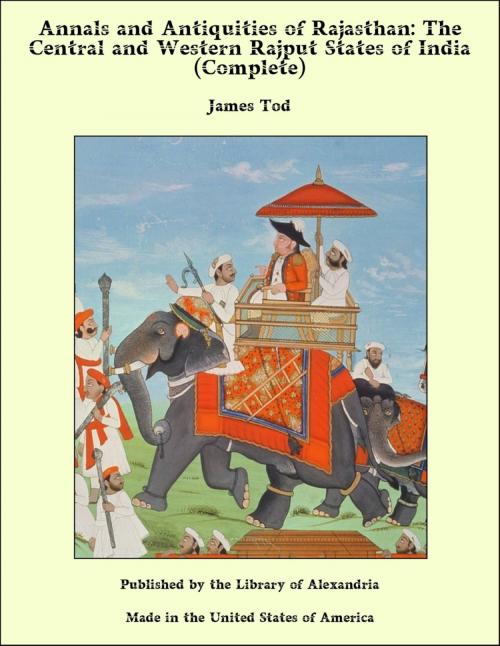Annals and Antiquities of Rajasthan: The Central and Western Rajput States of India (Complete)
Nonfiction, Religion & Spirituality, New Age, History, Fiction & Literature| Author: | James Tod | ISBN: | 9781465620415 |
| Publisher: | Library of Alexandria | Publication: | March 8, 2015 |
| Imprint: | Language: | English |
| Author: | James Tod |
| ISBN: | 9781465620415 |
| Publisher: | Library of Alexandria |
| Publication: | March 8, 2015 |
| Imprint: | |
| Language: | English |
In placing before the public the concluding volume of the Annals of Rajputana I have fulfilled what I considered to be a sacred obligation to the races amongst whom I have passed the better portion of my life; and although no man can more highly appreciate public approbation, I am far less eager to court that approbation than to awaken a sympathy for the objects of my work, the interesting people of Rajputana. I need add nothing to what was urged in the Introduction to the First Volume on the subject of Indian History; and trust that, however slight the analogy between the chronicles of the Hindus and those of Europe, as historical works, they will serve to banish the reproach, which India has so long laboured under, of possessing no records of past events: my only fear now is, that they may be thought redundant. I think I may confidently affirm, that whoever, without being alarmed at their bulk, has the patience attentively to peruse these Annals, cannot fail to become well acquainted with all the peculiar features of Hindu society, and will be enabled to trace the foundation and progress of each State in Rajputana, as well as to form a just notion of the character of a people, upon whom, at a future period, our existence in India may depend. Whatever novelty the inquirer into the origin of nations may find in these pages, I am ambitious to claim for them a higher title than a mass of mere archaeological data. To see humanity under every aspect, and to observe the influence of different creeds upon man in his social capacity, must ever be one of the highest sources of mental enjoyment; and I may hope that the personal qualities herein delineated, will allow the labourer in this vast field of philosophy to enlarge his sphere of acquaintance with human varieties. In the present circumstances of our alliance with these States, every trait of national character, and even every traditional incident, which, by leading us to understand and respect their peculiarities, may enable us to secure their friendship and esteem, become of infinite importance. The more we study their history, the better shall we comprehend the causes of their international quarrels, the origin of their tributary engagements, the secret principles of their mutual repulsion, and the sources of their strength and their weakness as an aggregate body: without which knowledge it is impossible we can arbitrate with justice in their national disputes; and, as respects ourselves, we may convert a means of defence into a source of bitter hostility. It has been my aim to diversify as much as possible the details of this volume. In the Annals of Marwar I have traced the conquest and peopling of an immense region by a handful of strangers; and have dwelt, perhaps, with tedious minuteness on the long reign of Raja Ajit Singh and the Thirty Years’ War; to show what the energy of one of these petty States, impelled by a sense of oppression, effected against the colossal power of its enemies. It is a portion of their history which should be deeply studied by those who have succeeded to the paramount power; for Aurangzeb had less reason to distrust the stability of his dominion than we have: yet what is now the house of Timur? The resources of Marwar were reduced to as low an ebb at the close of Aurangzeb’s reign, as they are at the present time; yet did that State surmount all its difficulties, and bring armies into the field that annihilated the forces of the empire. Let us not, then, mistake the supineness engendered by long oppression, for want of feeling, nor mete out to these high-spirited people the same measure of contumely, with which we have treated the subjects of our earlier conquests.
In placing before the public the concluding volume of the Annals of Rajputana I have fulfilled what I considered to be a sacred obligation to the races amongst whom I have passed the better portion of my life; and although no man can more highly appreciate public approbation, I am far less eager to court that approbation than to awaken a sympathy for the objects of my work, the interesting people of Rajputana. I need add nothing to what was urged in the Introduction to the First Volume on the subject of Indian History; and trust that, however slight the analogy between the chronicles of the Hindus and those of Europe, as historical works, they will serve to banish the reproach, which India has so long laboured under, of possessing no records of past events: my only fear now is, that they may be thought redundant. I think I may confidently affirm, that whoever, without being alarmed at their bulk, has the patience attentively to peruse these Annals, cannot fail to become well acquainted with all the peculiar features of Hindu society, and will be enabled to trace the foundation and progress of each State in Rajputana, as well as to form a just notion of the character of a people, upon whom, at a future period, our existence in India may depend. Whatever novelty the inquirer into the origin of nations may find in these pages, I am ambitious to claim for them a higher title than a mass of mere archaeological data. To see humanity under every aspect, and to observe the influence of different creeds upon man in his social capacity, must ever be one of the highest sources of mental enjoyment; and I may hope that the personal qualities herein delineated, will allow the labourer in this vast field of philosophy to enlarge his sphere of acquaintance with human varieties. In the present circumstances of our alliance with these States, every trait of national character, and even every traditional incident, which, by leading us to understand and respect their peculiarities, may enable us to secure their friendship and esteem, become of infinite importance. The more we study their history, the better shall we comprehend the causes of their international quarrels, the origin of their tributary engagements, the secret principles of their mutual repulsion, and the sources of their strength and their weakness as an aggregate body: without which knowledge it is impossible we can arbitrate with justice in their national disputes; and, as respects ourselves, we may convert a means of defence into a source of bitter hostility. It has been my aim to diversify as much as possible the details of this volume. In the Annals of Marwar I have traced the conquest and peopling of an immense region by a handful of strangers; and have dwelt, perhaps, with tedious minuteness on the long reign of Raja Ajit Singh and the Thirty Years’ War; to show what the energy of one of these petty States, impelled by a sense of oppression, effected against the colossal power of its enemies. It is a portion of their history which should be deeply studied by those who have succeeded to the paramount power; for Aurangzeb had less reason to distrust the stability of his dominion than we have: yet what is now the house of Timur? The resources of Marwar were reduced to as low an ebb at the close of Aurangzeb’s reign, as they are at the present time; yet did that State surmount all its difficulties, and bring armies into the field that annihilated the forces of the empire. Let us not, then, mistake the supineness engendered by long oppression, for want of feeling, nor mete out to these high-spirited people the same measure of contumely, with which we have treated the subjects of our earlier conquests.















